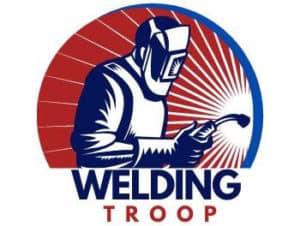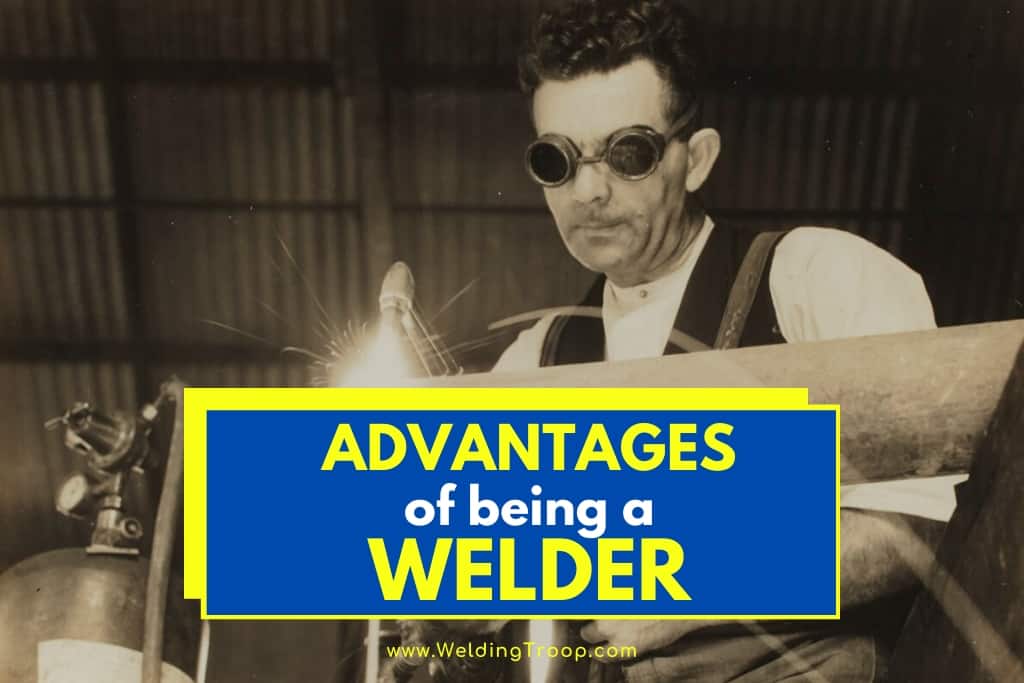If you’re the type of person that enjoys working with his or her hands, and you have a severe creative streak, you may want to consider welding as a profession. Welding gives you plenty of ways to explore your creativity, design, and repair items. For people that enjoy working with their hands, welding offers a great career opportunity that’s much safer nowadays than what it used to be. Today, we have the modern protective equipment that makes a massive difference.
So, what are the advantages of being a welder? There are several advantages of being a welder, including the following:
| Nr. | Pros/benefits of a welding career |
| 1 | You don’t need a university degree |
| 2 | You’ll always be needed |
| 3 | You’ll work in exciting places |
| 4 | You’ll have a great stepping-stone |
| 5 | You’ll have a wide variety of options for specialization |
| 6 | You have options when it comes to certifications |
| 7 | You’ll make excellent pay |
Since there isn’t much information on the Internet today that covers the advantages of becoming a welder, we created this article to help you out. Below we’ll cover the many pros of starting a welding career, along with discussing pay and work expectations.
Table of Contents
The Advantages of Becoming a Welder
There are several advantages of becoming a welder that you should consider if you want to pursue this profession.
#1 You Don’t Need a University Degree
While you do need to train appropriately to become a welder, you won’t need to pursue a university education if this is the career you want. Welding is one of the professions where having a university degree doesn’t matter because you can still make excellent pay.
Most standard welding jobs pay a significant amount. Also, if you are willing to work in different areas, like on an oil rig, you can earn more money than somebody with a bachelor’s degree.

#2 You’ll Always Be Needed
Another pro of becoming a welder is that there is always a consistent demand for welders pretty much nationwide. Welding comes into play throughout many parts of the construction and maintenance process, so welders are still needed. Other industries always need to employ welders for specific jobs, including:
- Mining
- Gas
- Oil
So, if you are looking for a stable career, welding provides you with an excellent opportunity.
#3 You’ll Work in Interesting Places
Earlier, we mentioned that you might wind up working on oil rigs if you become a welder. However, welders use their skills in other industries, too. Some welders even work for race car pit crews, for instance.

Other welders build ships and work in the military sector. You can also even use your welding skills if you’d prefer to use welding as a side job. As long as you obtain the correct training and certifications, you’ll be able to work almost anywhere.
#4 You’ll Have a Great Stepping-Stone
There are many jobs nowadays that don’t have much room for growth, unfortunately, and often turn out to be dead ends for many people. That means you have nowhere left to go after you reach a particular position in your job. When you are trapped in a situation like that, you’ll often feel bored and dissatisfied.
However, welding is a job that will never provide you with a dead end. It’s a significant step for people that want to keep on training. If you’re a proficient welder, you can move into many other jobs. These include:
- Manufacturing
- Repairing
- Engineering
- Teaching
- Research industries
These will allow you plenty of promotional opportunities.
#5 You’ll Have a Wide Variety of Options for Specializations
Since welders are needed in a wide variety of industries, there’s room for a variety of specializations, making it less likely that you’ll be bored. Welders are typically hired in sectors like:
- Architecture
- Construction
- Architecture
- Mining
And that’s just a shortlist of examples. Welders can train and learn more specializations, allowing them to find job possibilities everywhere.
#6 You Have Options When It Comes to Certifications
Most careers only give you one path when it comes to obtaining your education. However, welding, fortunately, isn’t like that. You can learn welding in high school in a vocational program even before you’re ready to enter the regular workforce.
On top of that, technical colleges also offer welding programs, which might be an excellent path to pursue if you want a job that brings you plenty of promotions.
You can also use on-the-job training to become a welder. This form of training is known as an apprenticeship program, and you’d learn a lot by training with a master welder.
Here, you can find an article from our website about the topic: How long does it take to learn welding?
#7 You’ll Make Excellent Pay
According to the Bureau of Labor Statistics (BLS), the average wage for welders is around $40,000 yearly or $18 per hour. The BLS also tells us that welders in the bottom 10% earn about $26,000 a year, and those in the upper 10% make over $60,000 yearly.
If you also think about overtime pay and other issues, some welders with the right skill sets are making well over six figures.
Furthermore, welders that either work on an oil rig or offshore often earn as much as $60,000 a year, which eventually transfers into $100,000 yearly after just a few years. Most underwater welders make six figures annually.
Along with the impressive salary that welders earn, most companies that hire welders also offer benefits that include:
- Health insurance
- Paid vacation
Most of the time, a welder’s salary will be set by the employer’s demand and the location of the job.
Before you continue reading, here is an article we wrote about the highest paying welding jobs and How much do welders make?
Work Hours and Family Balance | Is it worth being a welder?
Welders are often employed by construction companies or manufacturing plants, so there are many job opportunities in this industry. Most welders work typical 9-5 hours, alongside other construction workers. So, there’s plenty of opportunity with this job to have an ideal work and family balance. To my opinion, it is worth being a welder, you can spend more time after your work relaxing with the family.

What Welders Do
Welding uses heat and melting metal to combine pieces of metal permanently. Many industries use solder for a variety of reasons, including:
- To repair and make cars or car parts.
- To repair or make airplane parts or airplanes
- To correct or make ship parts or ships
- Constructing sheet-metal products.
- To join beams in construction for bridges and buildings
Some welders work as cutters. That means these particular welders utilize their tools to cut metal up into small pieces according to a blueprint. They then cut the structures up so that they can throw away the parts.
Welders are considered skilled or unskilled, depending on their training and welding knowledge.
- A skilled welder uses blueprints and written directions when they work. They also understand welding properties when it comes to metals.
- Unskilled welders work mostly in-home construction, shipbuilding, and similar fields. Some of them also work on assembly lines and perform repetitive work.
There are over a hundred different welding methods. Most of these processes use various gasses and electricity to generate the high temperature necessary to bond the materials together.
Arc welding, usually done with a machine or by hand, is the most popular form of welding. When a welder uses arc welding, he or she uses an arc, or an electric current, and runs it through the metal pieces they want to combine using a welding rod.
As the rod comes into contact with the metal pieces, it creates a robust electrical circuit. The high temperature from the heat then melts the metal so that it can be combined with another piece and solidified so that the connection is stable and permanent.
Gas welding is also a simplified process, and many different types of gasses are utilized. However, the most common gasses used in welding are:
- Acetylene
- Oxygen torch
In this form of welding, the welder works with a hot flame created by the torch to combine the metal pieces. After the metal is melted, a rod is melted into the joint. The rod helps to make the weld stronger.

